Table of Contents
- President's Corner
- ISHPSSB 2023: Afterthoughts from the Local Organizing Committee
- ISHPSSB 2023 prizes
- ISHPSSB 2024 Off-Year Workshops: Call for Proposals
- Travel Support Committee Report
- Treasurer's report
- Ad hoc Bylaws Committee report
- Ad hoc Respectful Behavior Committee report
- ISHPSSB 2025: Porto, Portugal
- Charles Pence's The Rise of Chance in Evolutionary Theory. Interview by Brian McLoone
- In memoriam Evelyn Fox Keller (1936–2023)
- In memoriam Everett Mendelsohn (1931–2023)
- Credits
President's Corner

The city was expensive, appropriate space was hard to find, and the Canadian immigration authorities made it especially difficult to obtain visas. Indeed, so great were some of the post-pandemic challenges encountered by organizers of the ISHPSSB 2023 meetings that it seemed like someone were actually conspiring against our having a meeting in Toronto at all; yet the meetings happened, thanks to the efforts of organizers who managed to pull off one of the most successful meetings we have ever had (Picture 1). Many of us attended in person, enjoying the talks and lively exchanges, and just being with each other again, but many were also able to participate by remote, relying on a hybrid format, some version of which will no doubt become standard practice in years to come (Picture 2).

In short, it was a glorious occasion, or so it felt to me, seeing everyone come together again, whether in person or by remote, especially because I've been involved in the organization for some 40 years or so. My memory of what became ISHPSSB goes back that far, and begins when I was a doctoral student at Cornell University, in Ithaca, New York invited to attend a workshop organized by the late Marjorie Grene and Dick Burian.

The topic, as I recall, dealt with contemporary issues in evolutionary theory, and Marjorie and Dick included some of the key players at the time, like Stephen J. Gould and Niles Eldredge, then leading the charge for reform with their theory of punctuated equilibrium. Marjorie and Dick understood that bringing together scientists with philosophers and historians would be a productive way to get at some of the prevailing disputes in evolutionary theory, but to also do better philosophy and history too. The setting, I need add, for anyone interested in the pre-history of our organization, was not exactly auspicious: it was in a fairly small and dark room above a grungy student pizza joint in Collegetown, just outside the gates of the Cornell campus. I have no idea how we ended up there, especially for what I recall were some notable public lectures — the chairs were old, and rickety, and made a lot of noise, and we were all crammed in there, but that made it all the more exciting, given the novel and provocative ideas raised by the invited luminaries. Marjorie was in her element, as I recall, battling with the best of them in her usual way, and the meetings were so successful overall, that she and Dick decided to continue holding workshops that brought together scientists with philosophers and historians after that.


The rest is history, of course. A number of meetings were held before 1989 when we had our first formal meeting at what was then called the University of Western Ontario, in London, Ontario and adopted the name of the ISHPSSB for our society. I vividly recall Marjorie laughing at what she called “the multi-lettered, multi-presidented society,” because no simple name could be found, and because inclusivity prevailed even then, so a number of honorary presidents were named to make sure no one associated with the early history of the organization would feel left out. I was in London, too, my old alma mater, and gave one of my first talks, as I recall, in what was my former pharmacology lecture room; I even stayed in my old residence hall, though I was hardly able to sleep from the excitement of being back there again, this time with a whole new set of friends. Those meetings were grand, especially so, because we all sensed something exciting was happening with the new society that welcomed multi-disciplinary and interdisciplinary approaches to understanding biology and that adopted an inclusive, informal and anti-elitist meeting style, one that welcomed unorthodox approaches from most anyone who wanted to join.


All these remembrances of meetings past came to mind when I arrived at the opening reception in Toronto. I was especially excited by this meeting of “Ish,” after the isolation of the COVID pandemic, though I confess that I enjoyed the 2021 meetings remote hosted by Cold Spring Harbor that made it possible for people to participate from all over the world. Hosted by both Western University and the University of Toronto, the 2023 meetings were especially meaningful since I attended both universities, and I still count southwestern Ontario as home. But I was saddened too, hugely so. We lost too many people this time around, and most were friends. I don't recall ever seeing a program with so many tributes and remembrances of people gone (Picture 3).

It made me appreciate veterans of the organization like Dick Burian, who made the meetings with Anne McNabb (Picture 4), who met with members attending the meeting for the first time (Picture 5), and the many other long-standing members, many now approaching retirement age or already there (Picture 6).

Whatever sadness I felt by the losses, was offset by the opening reception — I hardly knew anyone in the room! I saw many new people, most of whom were early career scholars, some attending their first meeting. Indeed, I was not the only one who noticed that the Toronto meetings were “unusually young,” a great sign that our society had a future and would continue to flourish, however great the losses become. It left me feeling very optimistic and with the sense that the society had turned a corner; it is fully mature with established traditions, and with well-defined values that widen the circle and on a global scale. The program itself was a celebration of multi-disciplinarity and interdisciplinarity, with scientists joining philosophers, historians and students of the social study of science sometimes in one session (Picture 7; Picture 8).
As president, I take great comfort and more than a little pride, in seeing how the society has evolved over the last 40 or so years, and think it is the strongest that it has ever been. I do have some ideas about how to continue to secure the organization further, especially financially, so as to make it more diverse and inclusive, still, but right now, at this moment, I want to welcome new members, thank everyone who has helped make the society what it is today, and to offer my own services to the organization so it can continue to flourish (Picture 9).
Betty Smocovitis, President
ISHPSSB 2023: Afterthoughts from the Local Organizing Committee
Organizing a conference like ISH is a significant task. Being new at this type of event planning, our expectations were surpassed. We learned a lot throughout the process and despite the numerous hurdles, we are pleased to have been able to put together a successful meeting. It goes without saying that we could not have done so without the help of many people. We would thus like to open this report by mentioning some of them here (apologies to those we might have missed).
Acknowledgments
Western University
- Kathleen Hill (Biology, advisor)
- Chris Smeenk (Rotman Institute, advisor)
- Kate Sinclaire (Rotman Institute, staff support)
- Cliff Fielder (Conference Services, coordinator)
- Patty Scheerer (Conference Services, staff support)
- And the entire team monitoring all the hybrid sessions throughout the week (Conference Services).
Toronto's Volunteers
- Emma Sigsworth
- Auguste Nahas
- Rachel Katz
- Paul Patton
- Cory Lewis
- David Rattray
- Fermin Fulda de la Garza
- Matthew McLaughlin
- Lis McMillan
- Marybel Menzies
- Kacper Mykietyn
- Xinyuan Liao
- Thomas Kaufman-Nash
- Fan Zhang
Guelph University
- Stefan Linquist (advisor and tour organizer)
One of the first things we did was choose themes and keynotes, which was done in collaboration with the Program Committee. Many themes were suggested, two of them stood out. Given the geographical location of the conference, South-West of Ontario, the Great Lakes came out as one of the obvious topics. It was difficult to choose one speaker, so we proposed to organize an interdisciplinary panel with four scholars: Blaire Morseau (University of Massachusetts Boston), Patricia Corcoran (Western), Jen Read (University of Michigan), and Marsha Richmond (Wayne State University). The questions for the panel were prepared in collaboration with Amy Fitzerald from the Great Lakes Institute for Environmental Research based in Windsor.
Also because of the geographical location, of Canada, another important theme, or should we say dimension, was Indigenous knowledge, which is included both in the panel on the Great Lakes and in the Keynote address by Deborah McGregor, an Indigenous scholar based at York University who works on climate change.
Finally, with the help of Rachel Ankeny and her connection at the Royal Ontario Museum (ROM), we were able to invite Soren Brothers, curator of Climate Change. To our pleasant surprise, we learned that Dr. Brothers is also conducting research on the Great Lakes at the University of Toronto, which made him a perfect fit for this conference.
Although the meeting took place in Toronto, the organization was a collaborative effort between Western University and the University of Toronto. Guelph was involved, too, especially in choosing themes and keynotes at the beginning and in the organization of one of the tours (Aquarium). The initial plan was to have Western in charge of the conference website and the organization of the virtual talks, while Toronto would be taking charge of the in-person components. Some of this division of labor happened, but in the end, the organizers in both institutions had to be part of all the components.
This collaboration was welcome if not necessary, but it also occasioned some unforeseen difficulties. Having many parties involved meant that we had many (many!) preparation meetings. One thing to note for future organizers: we eventually discovered that transferring money can be complicated. Having the registration funds collected at Western but most of the expenses in Toronto made for more administrative work and costs than expected. It also incurs a tax levy, which adds to the expenses.
The website was initially supposed to be hosted by the Rotman Institute. The unexpected departure of the administrative assistant forced us to look for another solution. We contracted Western Conference Services instead. They were great and we decided to work with them for many aspects of the conference, from abstract submissions, conference registrations, the online publication of the program, the creation of a booklet with a condensed program, and the necessary infrastructure and logistics for all the virtual talks. We would like to highlight that we were immensely fortunate to work with this team of experienced and competent people who were always on top of things, patiently obliging to numerous updates that we requested, and assisting us remotely throughout the meeting.
Although a fully hybrid meeting was out of reach, we succeeded in having more than half of the sessions available under this format. This required close collaboration between the Program and the Local committees and the expertise and resources of the Western Conference Services that provided the platform that allowed the integration of the online and in-person presentations in one destination. We were also fortunate to have the support from the IT team at the University of Toronto and their high-tech equipment that allowed for two-way communications during all the hybrid sessions. Finally, hybrid sessions were also supported by a team of invaluable volunteers trained in the use and troubleshooting of these devices.
Note to future organizers: a hybrid meeting makes things more convenient for some, but it is a logistical challenge, and it is not cheap. Having a hybrid meeting goes far beyond creating Zoom links and setting up the rooms with webcams. If you decide to go hybrid, hire professionals who already have the expertise and make sure you have access to the proper equipment way ahead of time. Also, make sure to factor in all the costs in the budget before you open registration. The total cost related to virtual components came near CA$30,000.
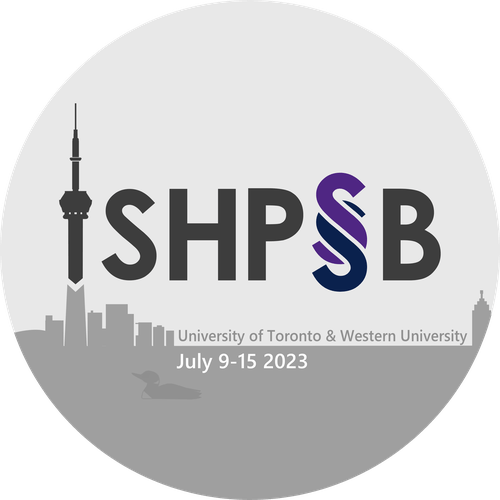
The conference logo was graciously created by Nathan Desjardins, a young artist based in London, Ontario. You can see some of his work on Artstation: https://www.artstation.com/kondroel
Toronto is an expensive city when it comes to accommodation. We were able to secure blocks of rooms with three hotels and to reserve 160 single and double rooms in one of the U. of T. Chestnut Residences at CA$151.55 plus tax for a single room and CA$179.80 plus tax for a double room. These are reasonable prices by Toronto standards. An additional waiting list was set aside for conference attendees. As of the last count, there were 722 room nights in single accommodation and 45 room nights in double rooms.
Traveling to Canada for a conference requires either a visa or some kind of visiting permit, which complicated matters for many participants. Having to apply for these documents after two-and-a-half years of pandemic and in the middle of a government employee strike made this especially long and stressful for many. We wrote numerous letters of invitation to facilitate this process and hired an assistant (Emma Sigsworth) to help.
The meeting had multiple occasions for the people in Toronto to gather over food and refreshments: an opening reception, a poster reception, a dinner, and two daily coffee breaks. All these events took place in different venues (Victoria College, the Myhal Centre on the St. George campus, and St-Michael's College) and required that we hire different catering companies.
Finding a suitable and affordable venue for the Conference Dinner proved especially challenging. The main issue was the size. About 275 people expressed interest in attending the dinner and we were not able to find a place for that many people. In the end, we had to reduce the dinner to 200 people, and this allowed us to find a venue at Saint Michael's College. The caterers at Saint Michael's College managed to put together an affordable buffet.
Along with the hybrid components, catering was the largest single expense. The cost to cater the coffee breaks, business meetings and poster reception came to over CA$25,000. The opening reception costs were just above CA$14,200. Finally, the dinner came to roughly CA$6,270.
We organized two excursions for Friday afternoon. The first one at the Royal Ontario Museum (ROM), a tour on Climate Change created by the Curator of Climate Change and our opening keynote, Soren Brothers. The second tour was organized by Stefan Linquist from Guelph, an aquarium enthusiast. This event included an exclusive backstage visit at the Ripley's Aquarium. Finally, the Fisher Rare Books Library offered two tours during the week for up to 20 participants each.
We had 472 people registering for the conference. The table below presents a breakdown by various categories. Note however that, in the end, we've had 506 speakers added to the platform (which unfortunately means that some people on the program decided to forgo registration).
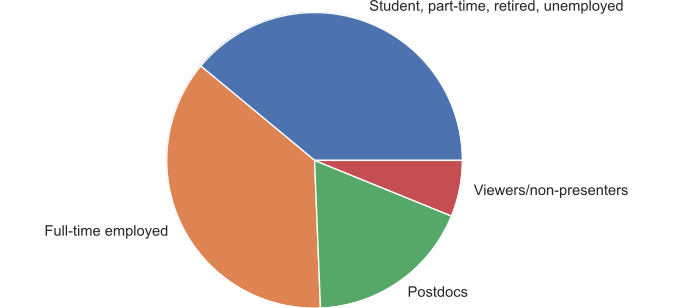
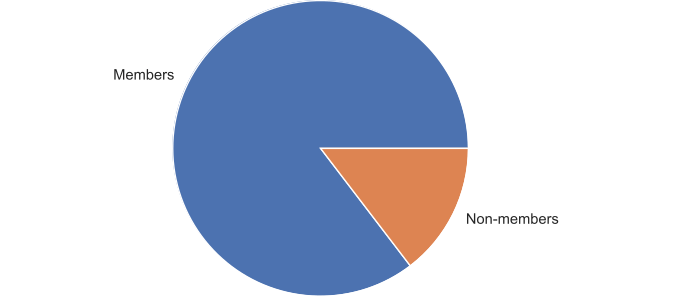

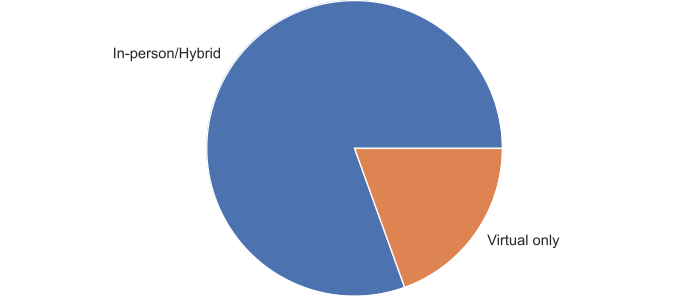
Some numbers were reported above. The big picture is that we are in the black!
| Income from registrations: | CA$101,535 |
| Income from sponsors: | CA$23,100 |
| Total cost: | CA$117,130 |
| Profit to ISHPSSB: | CA$7,505 |
Nothing was perfect, but we think that we can call this iteration of ISH a success! The best part was to see so many people after a long hiatus. ISH conferences are always stimulating, but mainly because of the quality of the presentations and the participation of so many great people. So, thanks to all of you!
Your local team,
Denis Walsh and Eric Desjardins
Co-Chairs of the Local Organizing Committee
ISHPSSB 2023 prizes
David L. Hull prize
The International Society for the History, Philosophy, and Social Studies of Biology awards the David L. Hull Prize biennially to honor the life and legacy of David L. Hull (1935–2010). The Hull Prize is awarded to an individual who has made extraordinary contributions to scholarship and service in ways that promote interdisciplinary connections between history, philosophy, social studies, and biology and has fostered younger scholars' careers. These strengths reflect the contributions of David Hull to our professions and our Society.
Garland Allen
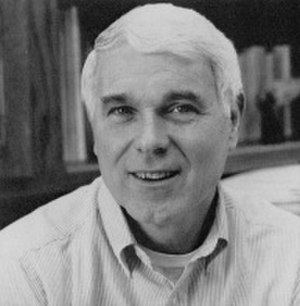
Nominations were considered by the 2023 Hull Prize Committee, consisting of Michel Morange, Greg Radick, Thomas Reydon, Vivette García Deister, and Marsha Richmond (Chair). In a break from tradition, the Committee this year bestows two prizes. We are pleased to award the Hull medal posthumously to Garland Edward Allen (1936–2023), Professor Emeritus of Biology at Washington University in St. Louis.
Gar's scholarship in the history of biology is well-known among historians and philosophers alike. Regarding ISH as his main professional organization and intellectual home, Gar was a regular fixture at meetings over his long career. He served the Society in many ways, notably as President from 2005 to 2007.
Gar was an expert in his discipline—the history of biology, dating from the establishment of the Journal of History of Biology in 1968 by Gar's major professor at Harvard, Everett Mendelsohn. (Years later, in 1998, Everett asked Gar to replace him as Editor of JHB, sharing duties with Jane Maienschein.) Beginning with JHB's first issue, Gar began publishing articles anchoring genetics' rapid growth to Thomas Hunt Morgan and the research program in Drosophila he carried out with a talented group of former students in Columbia University's “Fly Room.” Gar, however, also acknowledged the importance of other leading figures, writing about the views of Hugo de Vries, William Bateson, and Richard Benedict Goldschmidt. These contributions were critical to the founding of the history of genetics.
The importance of Gar's scholarship is well known. In 1975, Gar made a foundational contribution by publishing the textbook Life Science in the Twentieth Century, widely known and studied by generations of graduate students. This book was quickly followed in 1978 by his authoritative biography, Thomas Hunt Morgan: The Man and His Science. Both books, complemented by the numerous articles published throughout his long career, prompted his friend and fellow historian of biology Fred Churchill to label him “the most important interpreter of the history of turn-of-the-century American biology.” The breadth of his intellectual reach can also be seen in his critical writings on eugenics and the notable biology textbooks he authored and co-authored that embedded biological concepts in their historical and social contexts.
Gar considered ISHPSSB his intellectual home. He not only closely interacted with historians but, reflecting his strong belief in the value of interdisciplinarity, also with philosophers, science studies scholars, and working biologists. As many members of the ISH community well know, Gar consistently encouraged generations of upcoming scholars, reaching out as an equal despite his high ranking as a senior scholar, welcoming them, and making them feel valued.
While Gar did not seek awards or public recognition, he was honored to receive the Sarton Medal, the highest award bestowed by the History of Science Society in 2017. Undoubtedly, he would have been even more pleased to receive the 2023 David L. Hull Prize. It is bittersweet not to be able to present the Hull Prize medal to Gar in person, but highly appropriate to formally acknowledge his extraordinary contributions to the Society and the profession.
John Dupré
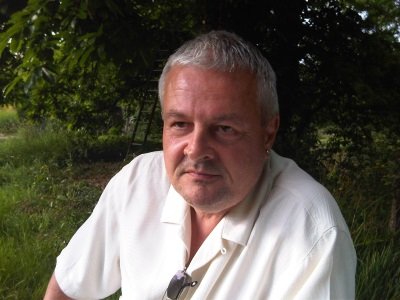
On behalf of the Society, the 2023 David L. Hull Prize Committee, consisting of Vivette García Deister, Michel Morange, Gregory Radick, Thomas Reydon, and Marsha Richmond (Chair), decided this year to award two prizes.
We are pleased to award the Hull medal to John Dupré, Professor of Philosophy of Science and Consulting Director of Egenis at the University of Exeter.
After receiving degrees from the Universities of Oxford and Cambridge, John taught at Stanford University, Birkbeck College (University of London), and the University of Exeter. He has been elected to the American Association for the Advancement of Science, the American Academy of Arts and Sciences, and (this year) to the American Philosophical Society.
John's scholarship exemplifies the interdisciplinary approach to studying the life sciences that is characteristic of the Society. His seminal contributions to the philosophy of biology, general philosophy of science, metaphysics and epistemology in general, central debates in biology and society, and the public understanding of science are voluminous.
As one of the prominent representatives of what became known as the "Stanford School," John played a key role in reshaping general philosophy of science in the second half of the twentieth century by focusing attention more firmly on the variety of practices that are found in the sciences, as well as the social and historical context in which science is done. His book, The Disorder of Things (1993), weaved together focal topics in the philosophy of biology, such as the ongoing debate on the foundations of biological classification and the nature of species, with central debates in general metaphysics on such issues as natural kinds, causation and determinism, as well as the long-standing discussion in general philosophy of science on reductionism and the unity of science. The book has influenced multiple generations of philosophers in various areas of specialization and will continue to do so for the foreseeable future.
A similar lasting influence is John's more recent development of a processual perspective on the phenomena of life, culminating, among other things, in his 2018 co-edited book, Everything Flows. This book represents a fundamental rethinking of the metaphysics of the living world that has opened up new lines of research in metaphysics, the philosophy of biology, the philosophy of medicine, and other fields. John's scholarship has strongly affected academic thinking and the public debate on critical societal aspects of biology. His criticisms of evolutionary psychology and his detailed analysis (in collaborations with sociologists) of what advances in genomics research imply for human life and human societies — and perhaps more importantly, what they do not imply — have yielded key insights for the public understanding of these areas of science and their possible effects on society.
John has not only shaped the field through his extensive scholarship and writing but also through his tireless leadership in the academic community. John served as President of the British Society for the Philosophy of Science and, most recently, as President of the Philosophy of Science Association. In the international academic community, John has long advocated for closer connections between philosophy of science and scientific practice, and for more integrative collaboration between philosophers, social scientists, historians, and scientists. His engagement and generosity in mentoring younger scholars is known to everyone who ever interacted with John as an early-career scholar — as many of us have. This is especially manifested in John's long-term membership of the European Advanced School in the Philosophy of the Life Sciences' Steering Committee, which since 2012 has offered a biennial summer school for graduate students and early-career postdocs, which the Society has recently supported as an off-year workshop.
Perhaps John's most notable institutional contribution was as founder of Egenis, the Centre for the Study of Life Sciences at the University of Exeter, of which he was Director for twenty years. Conceived as an interdisciplinary institute and known for integrative history, philosophy, and social studies of the life sciences, Egenis has hosted scores of researchers, workshops, and conferences, including the ISHPSSB meeting in 2007. Many academics, especially early-career scholars, have benefited from its highly supportive and stimulating intellectual atmosphere, influenced by John's accessible and open personality.
The depth and scope of John's scholarship, his tireless service to the disciplines represented in the Society, and his generosity towards early-career scholars exemplify the spirit of David Hull. We are delighted to award John the 2023 David L. Hull Prize.
Marsha Richmond
Chair of the Hull Prize Committee
Marjorie Grene prize
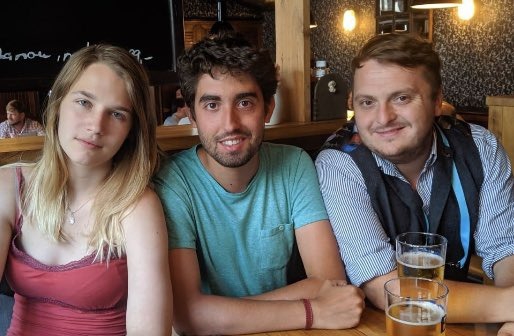
The Marjorie Grene Prize is awarded every two years for the best manuscript based on a presentation at one of the two previous ISHPSSB meetings by someone who was, at the time of presentation, a graduate student. The prize is named after Marjorie Grene both because her work in the history and philosophy of biology exemplifies the strong spirit of interdisciplinary work fundamental to ISHPSSB, and because she played a central role in bringing together diverse scholars of biology even before the formation of the Society. She was a valued mentor to many members of the Society and a long-standing inspiration to all.
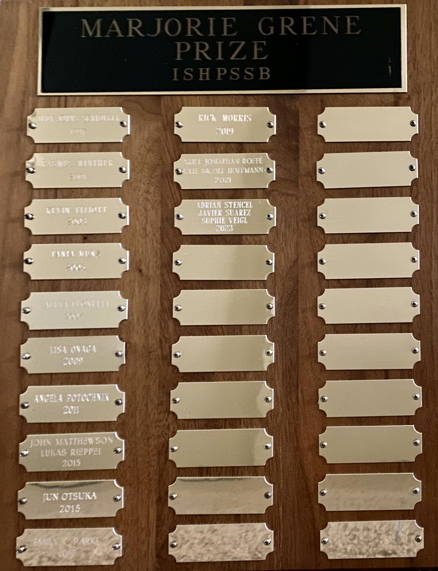
The winners of the Grene prize 2023 are Adrian Stencel, Javier Suarez, and Sophie Veigl for their paper: “Rethinking Hereditary Relations: The Reconstitutor as the Evolutionary Unit of Heredity.” The paper was presented during the Oslo meeting in 2019 and published in Synthese in 2022. In this paper, the authors propose to replace the notions of “replicator,” “reproducer,” and “Darwinian individual” by the notion of a “reconstitutor” as the unit of heredity. A reconstitutor is “the structure resulting from a set of relationships between different elements or processes that are actively involved in the recreation of a specific phenotypic variant in each generation regardless of the biomolecular basis of the elements or whether they stand in a continuous line of ancestry.” In contrast, they argue, replicator, reproducer and Darwinian individuals all rely on the condition of lineage formation. The paper goes through thorough examination of philosophical and biological literature and proposes a strong, ambitious and original alternative model of heredity.
Jim Griesemer
Co-chair of the Marjorie Grene and Werner Callebaut Prizes Committee
Werner Callebaut prize
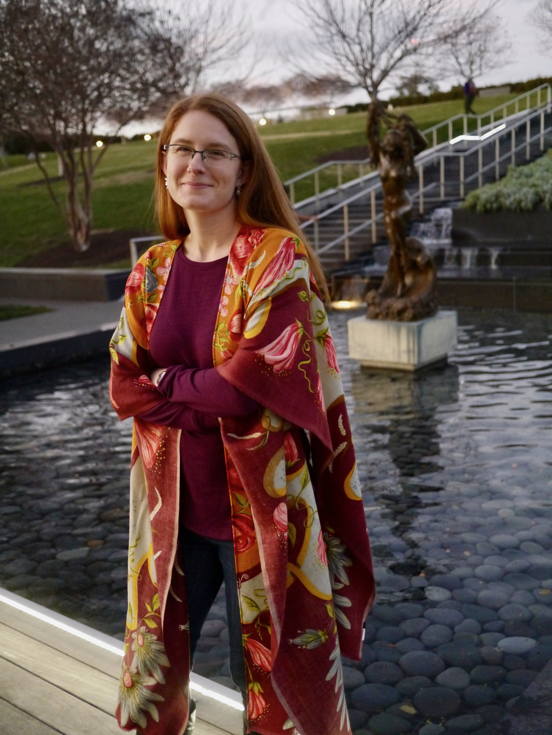
The Callebaut Prize was established in 2015, and is awarded every two years. It is intended to advance the careers of recent graduates working at the intersection of the fields represented by ISHPSSB by recognizing the best manuscript utilizing an interdisciplinary approach based on a presentation at one of the two previous ISH meetings by someone who was, at the time of presentation, a graduate student. The prize is named in honor of Werner Callebaut, whose untimely death in 2014 was mourned by the philosophy of biology community worldwide and particularly ISH members, and who made considerable contributions to the promotion of constructive dialogue and reciprocal respect in philosophical and scientific work, hence making a prize focused on interdisciplinarity most appropriate.
We are grateful to individual donors who have supported this prize, as well as to the Konrad Lorenz Institute for Evolution and Cognition Research (KLI) for support for the first three prizes.
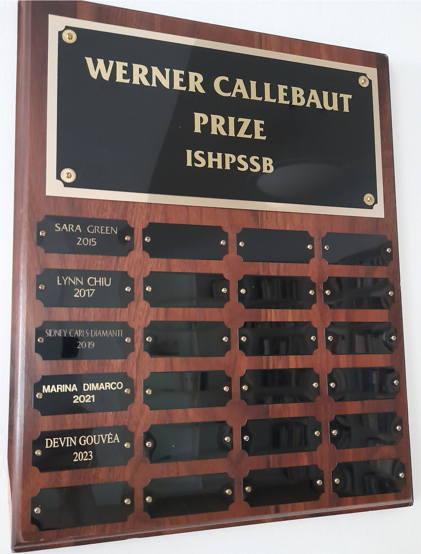
The winner of the Callebaut prize 2023 is Devin Gouvêa for her paper: “Historicizing the homology problem.” The paper was presented during the Oslo meeting in 2019 and published in Studies in History and Philosophy of Science in 2023. In this paper, the author questions the historical relevance of a strong contrast between the historical and the mechanical views of homological sameness, as rooted respectively in common ancestry and shared developmental resources. In particular, she revisits the interpretation that Otto Haas and George Gaylord Simpson gave of Edwin Ray Lankester as representative of the historical view, and the discussion that Simpson had with Boyden on the same question. This well-informed and solid historical analysis uses archives and correspondence, and shows awareness of relevant issues in systematics and other adjacent fields. It is completed with a discussion of contemporary philosophical contributions on homology, specifically, with Brigandt's notion of an epistemic goal. The committee was impressed by the mastery of these domains and the clever articulation of arguments relevant to all of them.
Jim Griesemer
Co-chair of the Marjorie Grene and Werner Callebaut Prizes Committee
Interdisciplinary session prize
In light of the many exceptional interdisciplinary sessions, this year's Adjudication Committee decided to also make an Honorable mention for the session "The forgotten kingdom: Lessons from the history and philosophy of plant biology". This session's participants were Bendik Hellem Aaby, Jan Baedke, Caterina Schürch, Jalal Soltani, Sonia Sultan, and Özlem Yilmaz.
We are pleased to announce that the recipient of the 2023 Interdisciplinary Organized Session Prize was the session "Biological sex: Explanans and explananda". The participants of the winning session were Marina DiMarco, Kyra Hoerr, and Aja Watkins.
Probing historical, philosophical, and social dimensions of research on (or relying on the notion of) biological sex, this session embodied the ISHPSSB ideal of cohesive and transformative interdisciplinarity. The diverse presentations ranged from sex development at the cellular level to women's health policies advocating sex-specific dosing for pharmaceuticals and the biological coherence and need for the very notion of 'sex.' The session featured junior scholars who had engaged in collaborative research, and concluded with very lively, engaging, and critical discussion.
We thank our Adjudication Committee, consisting of Yin Chung Au, Ingo Brigandt, Vivette García Deister, Maria Elice de Brzezinski Prestes, Siobhan Guerrero McManus, Abigail Nieves Delgado, and Sophie Veigl.
Ingo Brigandt and Vivette García Deister
Co-Chairs of the Interdisciplinary Organized Session Prize Committee
Poster flash talk prize
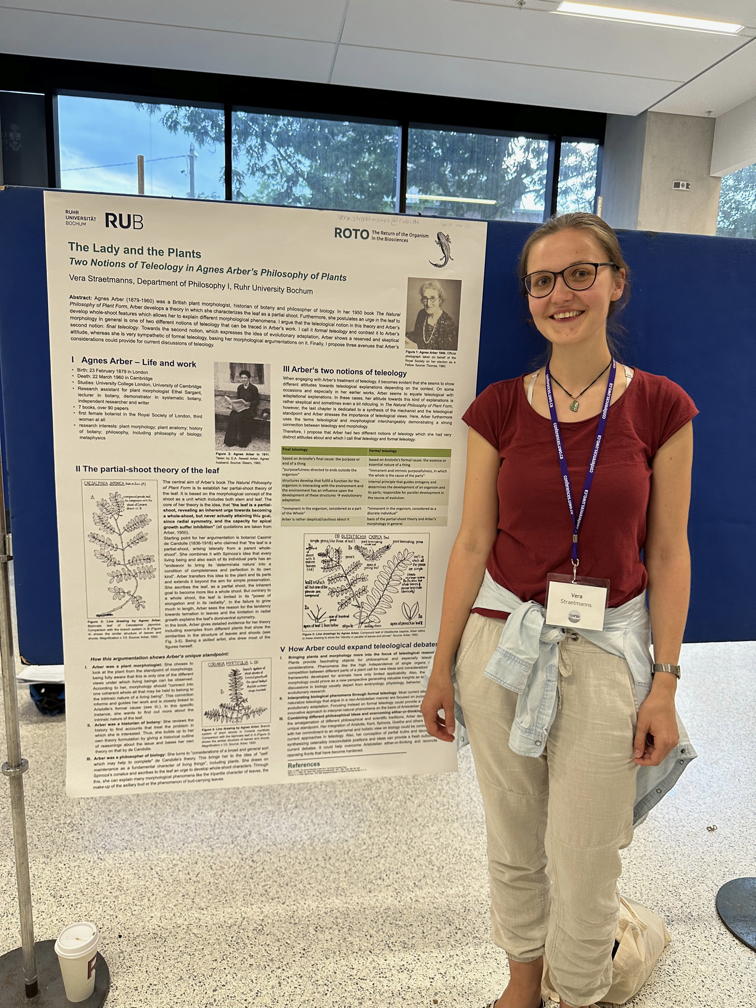
The Poster Flash Talk Prize for 2022–2023 was awarded to Vera Straetmanns at Ruhr University, Bochum for her innovative poster and especially entertaining video of her “Flash Talk” on it titled “The Lady and the Plants: Two Notions of Teleology in Agnes Arber's Philosophy of Plants.”
The Poster Flash Talk Prize is awarded biannually for the best poster presented at the meetings and a one-minute video or “Flash Talk” that is informative, innovative and entertaining. It is adjudicated by the Program Committee, which in 2022–2023 was comprised of the Program Co-Chairs Jan Baedke and Tatjana Buklijas, and committee members Matt Haber, Stephanie Lloyd, Siobhan F. Guerrero McManus, Francesca Merlin, Ayako Sakurai, Ana Soto and Tobias Uller (Baedke and Haber recused themselves from the adjudication this year).
The Program Committee praised the quality of the “Flash Talks” as a whole, and encourage their submission at future meetings. They have provided the following video links where members may view the rich and creative efforts at reaching out to wider audiences with interdisciplinary and groundbreaking pedagogical techniques.
Nominees
Vera Straetmanns – Ruhr University Bochum
2023 Poster Flash Talk Awardee
The Lady and the Plants: Two Notions of Teleology in Agnes Arber´s Philosophy of Plants
Matt Haber – University of Utah
The recursive account of individuality
Christopher Joseph An – University of Edinburgh
The exaptive evolutionary origins of normative agency: The role of social play and discursive communication in the developmental niche
Marshall Abrams – University of Alabama at Birmingham
Trait fitness is fundamental
Ludmila Litvin – Berlin Institute of Health (Charité)
A critical reflection on functional magnetic resonance imaging as an imaging method in neuroscientific research
Chia Yun (Cherina) Cheng – University of Pittsburgh
Is a digital phenotype really a phenotype?
Svetlana Kuleshova (and Marina González Varas) – Nicolaus Copernicus University & CNRS, Université Paris Nanterre
The limits of understanding: Approaching otherness in extinct Homos and non-human primates
Rose Gatfield-Jeffries – University of Cambridge
Robust or busted? Examining the variety of evidence thesis in the case of menstrual synchrony
Andrea Hiott – University Heidelberg
Waymaking: a nested biological approach to knowledge acquisition based on heuristics of the hippocampal formation
ISHPSSB 2024 Off-Year Workshops: Call for Proposals
ISHPSSB Off-Year Workshops began in 2004 as a way for members of the ISHPSSB community to meet in smaller settings outside of the general meeting. Topics and themes have ranged from professional development to focused research topics.
ISHPSSB invites proposals for Off-Year Workshops taking place during 2024. These may be stand-alone workshops, or add-on workshops adjacent to or incorporated with other meetings. ISHPSSB will help publicize sponsored Off-Year Workshops, provide advice and consultation for organizers, and include a description of the Workshop on society web pages. Limited funding is available to help offset graduate student travel costs for ISHPSSB members.
Consideration for funded proposals will begin February 1. Funded proposals received after February 1 will still be considered on a rolling basis while funds remain. Proposals for unfunded sponsorship are accepted through 2024. Please submit your proposals at this link.
ISHPSSB Off-Year Workshops should aim to:
- Drive new ISHPSSB membership;
- Engage and include current ISHPSSB members;
- Support and expand ISHPSSB diversity and inclusion goals;
- Promote professional development and mentoring;
- Pilot hybrid or other creative formats that might be used at general ISHPSSB meetings or other future off-year workshops; or
- Embody and support ISHPSSB's commitment to interdisciplinary research and community building.
Modalities of Off-Year Workshop proposals we encourage:
- Continuation of traditional off-year workshops;
- Add-on Workshops. Workshops adjacent to or incorporated with other workshops/conferences, especially meetings of cognate professional societies of biologists, historians, or social scientists;
- Professional Development Workshops;
- Expanding ISHPSSB's Reach. Workshops that seek to expand (a) regional inclusion; (b) disciplinary participation in ISHPSSB; or (c) other outreach efforts in support of ISHPSSB diversity and inclusion goals;
- Experimental Workshops.
Proposal Instructions
Proposals should include the following information and be submitted online at this link: https://forms.gle/aqfgXtVppZBAQW5X81
- Name, Affiliation, and Contact Information for Workshop Coordinators
- Workshop website (if available)
- Proposed Workshop Topic (250 words)
- Which Off-Year Workshop Goals Does This Target?
- Program Information (if available)
- Proposed Site (if applicable)
- Proposed Modality (in-person, hybrid, virtual, other; please describe)
- Proposed Dates
- Funding Request (if relevant)
ISHPSSB funds are restricted to offsetting graduate student travel costs to your workshop for ISHPSSB members; ISHPSSB funds may not be used to fund other aspects of your workshop. Historically, funding has been limited to about US$1,000 per workshop. Funds are limited this year, but funding requests will be considered until the budget is exhausted.
Proposals must be submitted through the Google form. Instructions are included at the link and should be straightforward.
Proposal Requirements
- Workshops may be organized around focused topics or broader themes, or have a clear professional development aim/audience. Regardless, the workshop should carry broad appeal to ISHPSSB membership and clearly meet the aims of Off-Year Workshops.
- Workshops should be open to all members of ISHPSSB.
- Workshops should be organized so as to foster the Society's ideals of interdisciplinarity and international research collaboration, and should promote open interactions between members from graduate students to senior faculty.
If you have questions about hosting a workshop, we strongly encourage you to reach out to the Off-Year Workshop Committee by contacting its Chair, Matt Haber (
Matt Haber
Chair of the Off-Year Workshop Committee
Travel Support Committee Report
The Travel Support Committee in 2021–23 consisted of the following members: Don Opitz (Treasurer and chair); Rachel Ankeny (President); Laura Perini (Past Treasurer); Fiorela Alassia (Student/Early Career Member); and Drew Inkpen (Member). We thank outgoing members Rachel and Fiorela, and we welcome incoming members, Betty Smocovitis (President) and Jarrett Joubert (Student Member).
In 2022–23, Council committed US$3,000 to off-year workshop travel support, of which US$2,738.35 was paid to recipients selected by the respective organizers of three conferences: EASPLS, PBCS XI, and UNAM's “Triple Helix” workshop.
For the biennial conference held in Toronto in July, Council committed US$54,274 in travel support funding, of which US$14,700 was generated from the NSF conference travel grant (for the benefit of US based awardees) administered by the HSS, and US$1,500 from Elsevier (for the benefit of “Region Y” based awardees). Provisional awards were extended to eighty eligible applicants; final award payments came to a total of US$45,231.63. This total also includes the fees charged for payments to foreign accounts, which totaled US$216.84.
The total in travel grants paid came under the amount Council had committed owing to two main factors: (a) withdrawn applications; and (b) reimbursement requests that involved lower-than-projected eligible expense items. (The reasons for this varied and included funding obtained from other sources.) The TSC approved redistribution of unspent allotments to other applicants (seventeen of the eighty) whose eligible expenses exceeded their provisional award amounts, but without exceeding the caps allowed under the respective grant program's rules.
Across both funding programs (NSF and ISHPSSB), eligible expenses included long-haul travel costs (by flight, train, coach, or car) and registration fees. Lodging expenses were allowable only under the ISHPSSB grant program. Individual awards were capped at a maximum of US$1,000. The grant programs benefited students, early-career scholars (primarily post-doctoral researchers), and independent scholars. Only expenses not funded from other sources, and which met the grant programs' criteria, were reimbursable.
The TSC thanks the applicants for their diligent submission of applications and reimbursement documents, and several Society members for their feedback on various aspects to the grant program operations, which the TSC will take into account when planning for the next grant cycle.
Don Opitz
Chair of the Travel Support Committee
Treasurer's report
As reported at the member's business meeting held in Toronto, fiscally speaking, ISHPSSB is solvent with account balances totaling US$197,924.92 as of June 30, 2023. This is a growth of $10,456.03 over the prior year's balance of US$187,468.89 (as of June 30, 2022).
For the 2022–23 period, most of ISHPSSB's gross income of $14,518.14 was generated through membership dues; other sources include donations and sponsorships. Expenses totaling US$4,062.11 for this same period included student/early-career travel support (for off-year workshops) of US$2,738.35, operations expenses of US$802.27, and IUHPST member dues of US$521.49. (The major operations expense consisted of PayPal transaction fees of US$629.14.)
Since July's report, we received additional income from the NSF conference travel grant administered by HSS, in the amount of US$14,700. We are anticipating proceeds from the Toronto conference totaling CA$18,034.76. On the expense side, we paid out US$45,231.63 in travel support for the Toronto conference to students, early-career scholars, and independent scholars. (See Travel Support Committee report above.)
Don Opitz
Treasurer
Ad hoc Bylaws Committee report
The Ad hoc Bylaws Committee, consisting of three past presidents, Lindley Darden, Jim Griesemer, and Marsha Richmond (chair), was charged with reviewing the Society's original 1990 Bylaws and bringing them in line with current Society practices and organizational structure. Surprisingly, only a few provisions required updating, most notably those that did not comply with the Code of Virginia, where ISHPSSB is incorporated as a non-profit, non-stock corporation. As per the Bylaws, members were allowed to review the proposed changes 25 days before the biennial members' meeting and voted to accept the revisions at the Business Meeting in Toronto. The Society should not have to undertake another significant Bylaws overhaul for another three decades!
Marsha Richmond
Chair of the Ad hoc Bylaws Committee
Ad hoc Respectful Behavior Committee report
The 2023 Ad Hoc Respectful Behavior Committee (Judy Johns Schloegel, Don Opitz, and Marsha Richmond) was charged with revising the Respectful Behavior Policy to add a means of implementation. The Council approved the revised policy in May 2023 (see Code-of-conduct). The policy provides a statement of the interpersonal behavior expected of members and conference participants and the mechanism for reporting and adjudicating alleged inappropriate behavior.
It creates an Ombuds Committee, consisting of two members charged with collecting reports from involved parties, and a three-person Respectful Behavior Subcommittee of Council that deliberates reported cases. Matt Haber and Marsha Richmond were asked to serve four-year terms as Ombudspersons; the 2023–2025 Council Respectful Behavior Committee consists of Don Opitz (chair), Ana Soto, and Abigail Nieves Delgado.
Marsha Richmond
Chair of the Ad hoc Respectful Behavior Committee
ISHPSSB 2025: Porto, Portugal
We look forward to welcoming you all in Porto, Portugal, and to the 2025 “Ishkabibble” conference to be held in the third week of July.
The city of Porto
Located on the north-west coast of Portugal, Porto is the second largest city in Portugal. Built on a hillside of the Douro River overlooking its mouth, Porto has a two thousand years history, going back to the Roman times. Since 1996, the Historic Center of Porto has been designated a UNESCO World Heritage Site.
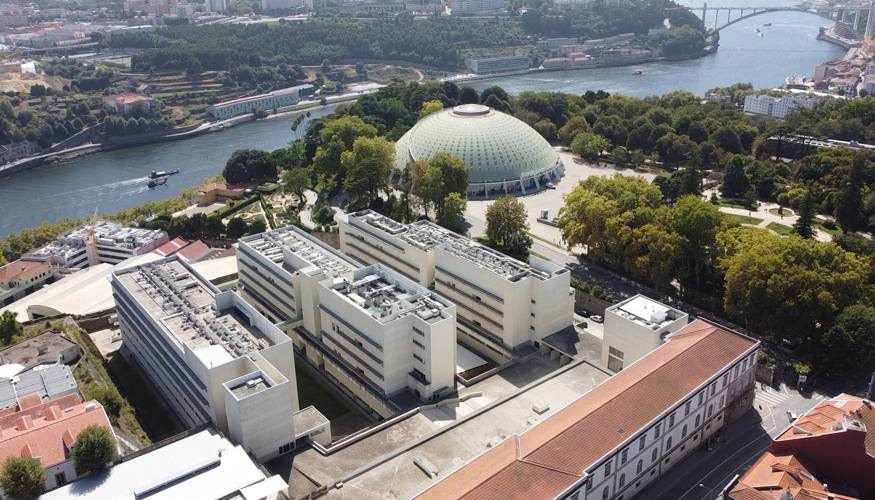
Awarded Best City Destination in Europe several times (World Travel Awards), Porto is one of the liveliest historical towns in Europe. Cosmopolitan since early times, the city is presently a vibrant cultural hub and its cultural features are key elements of the urban life. Porto is very well known for its architecture, of which both magnificent baroque and several modern and unique buildings stand out. The city is also renowned for the famous, internationally appreciated, port wine. Visitors can enjoy museums, cultural events in concert halls or theater venues, restaurants serving the local cuisine and a spirited nightlife. And there are also several Blue Flag Atlantic beaches within the city limits.
July is usually a dry period in Portugal and in Porto the average maximum air temperature is about 25 ºC. The daylight period in July is about 15 hours, with sunrise happening at 6 am.
Porto is well connected to major international destinations with direct flights within Europe and from some cities in North America and Brazil, although in these cases connecting flights are the most common. There are several low-cost options. Porto Airport is located at less than 15 km from the city center, and when arriving passengers have various public transportation options.
There are diverse accommodation options in the city center and in close vicinity of the conference venues. Major national and international hotel chains can be found within walking distance of the venues (or by public transportation to them). Currently, Porto receives many tourists during all seasons, so it is advisable to make reservations in advance.
Organizers
The conference organization is an initiative of the School of Medicine and Biomedical Sciences of the University of Porto (ICBAS) as logistic host, in partnership with UPORTO/MNHC-UP, the Natural History and Science Museum of the University of Porto.
Founded in 1911, the University of Porto (U.Porto) is a public university and a leading teaching and scientific research institution. Conceived as a multidisciplinary institution devoted to the life and health sciences, the School of Medicine and Biomedical Sciences (Instituto de Ciências Biomédicas Abel Salazar, ICBAS) was founded in 1975. The MHNC-UP (Natural History and Science Museum of the University of Porto) was officially created in 2015 as the outcome of the fusion between the Museum of Natural History and the Science Museum of the U.Porto. It is committed to preserving, promoting, studying and raising awareness about our natural world, built up through education and research-related activities carried out by U.Porto. Other institutions in Portugal are associated with the conference organization through the members of the Local Arrangements Committee (LAC).
The organization is a transversal effort of a team gathering people from diverse disciplinary backgrounds (life and health sciences, history and philosophy of science, social sciences) and institutions (schools, research units and a natural history and science museum). LAC includes scholars from the Universities of Porto, Coimbra and Lisbon, the three oldest universities in the country, as well as NOVA University Lisbon, this way broadening the covered areas and, in a sense, following the ISHPSSB tradition of fostering cooperation across disciplines. The committee is supported by a group of advisors linked to the same three universities.
We will work in close relation with the Program Committee, co-chaired by Charles H. Pence and Kate MacCord, to hold a great, sustainable and inclusive conference.
Venues
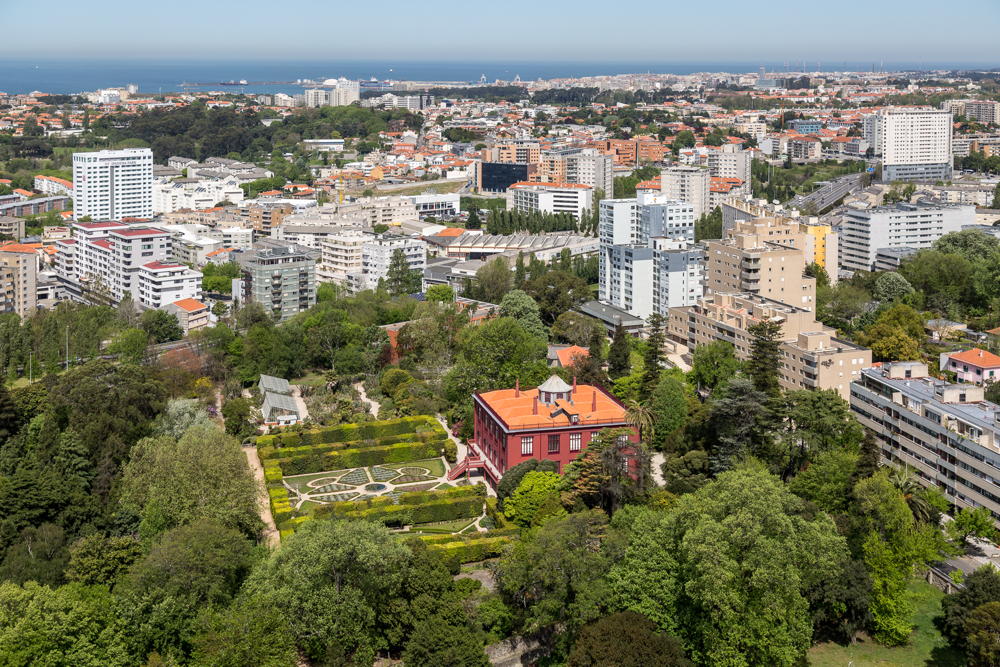
ICBAS is located at the central campus of U.Porto, at the city center and next to a large public garden, Jardins do Palácio de Cristal. It is easily reached by walking or public transportation.
The building has rooms well equipped for these kinds of events, also taking into account accessibility. The rooms for the parallel sessions are close to each other, all on the same floor (side by side). The auditoriums and the small rooms are accessible also internally for people with reduced mobility (in these cases, the auditoriums must be accessed by the ground floor); accessible bathrooms are available. The building itself is accessible from street level, although the street is downhill. Considering auditorium size requirements, the plenary sessions are planned to take place in an auditorium located in front of ICBAS, on the other side of the street, in Super Bock Arena — Pavilhão Rosa Mota, at Jardins do Palácio de Cristal.
The welcome reception (organized by the MHNC-UP with the support of the House of the Arts) will be combined with an open program in the Hall of Biodiversity and the Botanical Garden. The conference dinner is planned to be held at the Stock Exchange Palace (Palácio da Bolsa) in the city center.
Regarding the virtual space, we will build on the Toronto 2023 experience and the post-meeting survey results.
Beyond the conference
The city of Porto can provide an amazing experience for tourists: those who love museums, architecture, gardens/parks or bars will have plenty to enjoy. Additionally, coming to Porto can be an opportunity to take small trips — one day or longer — to a few popular destinations in the North of Portugal, like the Douro Valley (the Alto Douro Wine Region is a UNESCO World Heritage Site) or the Minho province; or to the Center and South of Portugal — Coimbra and Lisbon, for instance. A getaway to Galicia (Northwest Spain) is also a pleasant possibility.
Maria Strecht Almeida
Chair of the Local Arrangements Committee
Charles Pence's The Rise of Chance in Evolutionary Theory. Interview by Brian McLoone
![The Rise of Chance [cover]](/images/2023-London_Ontario/cover-Pence2023.jpg) Charles Pence's book The Rise of Chance in Evolutionary Theory: A Pompous Parade of Arithmetic is a wonderful and insightful exploration of how notions of chance developed from the Origin through Fisher's Genetical Theory of Natural Selection and a bit thereafter. Below I interview Pence about some of the core claims in the book.
Charles Pence's book The Rise of Chance in Evolutionary Theory: A Pompous Parade of Arithmetic is a wonderful and insightful exploration of how notions of chance developed from the Origin through Fisher's Genetical Theory of Natural Selection and a bit thereafter. Below I interview Pence about some of the core claims in the book.
BM: In his book The Origins of Theoretical Population Genetics, Provine characterizes the debate between biometricians and Mendelians as one in which there is a great intellectual chasm between the two sides, and little effort to bridge the chasm. You argue that Provine greatly overstates the divide. In fact, in the period from 1906 to 1918, you claim, one sees a good amount of work that integrates (or attempts to integrate) the two approaches, and this is reflected even in the textbooks. Yes, there was a great personal animosity between Bateson and Pearson (for instance), and Bateson and Pearson were themselves overly skeptical of the other's approach, but Bateson and Pearson are not accurate representatives of the intellectual milieu at this time. Have I accurately characterized your view? How and when did you start to realize that Provine had it wrong?
CP: This is bang on. To borrow from Darwin, that fifth chapter is “my pet bit in my book.” I think the idea that there is some kind of massive fight here, one that enlisted the large part of practicing biologists, and one that defined people's whole conceptions of what they were doing in their field for twenty or thirty years, just isn't borne out by the historical record. I was frankly flabbergasted by the even-handedness of the textbook literature when I read it for the first time.
As for when I started to get suspicious, I think I probably worked my way into it backwards. I had decided pretty early on in the project to stop with Fisher's (Genetical Theory of Natural Selection), just because I needed somewhere to call a halt to the narrative, and if I went any farther (of course, later Fisher, and then Wright and Haldane have to be part of this story too, right?) the book would have exploded into a whole narrative of the Modern Synthesis, which others have done better than I have (and in any case would have turned it into something much larger than I wanted to write). So, of course, I already knew that Fisher had read his Pearson. That line of transmission was extremely clear. But that's thin gruel for a transmission story; I really wanted to be able to show that the kinds of stuff I was describing as a “Weldonian” moment in the history of biology wasn't merely a dead-end branch on the evolutionary tree, something that was more or less transcended and discarded by dint of Fisher's having reinvented the whole damn thing himself. (I was open to that being the answer in any case, in which my book would, in turn, have taken on the kind of wistful nostalgia that I talk about in people like Provine and Sturtevant — ah, had we only listened to Weldon, we might have done so much better!)
BM: As you describe, Darwin believed that appeals to chance in biology are necessary because of our ignorance of the underlying physical processes, which are actually deterministic. Fisher, on the other hand, believes the underlying physical processes are indeterministic, as he laid out in an interesting article in the first issue of Philosophy of Science. Why, then, is Fisher so often associated with the belief that chance processes can be ignored when thinking about evolution and natural selection?
CP: My guess is that this has to do with Fisher's positions in his debate with Wright and his opposition to shifting-balance theory. But I think it's important to remember that Fisher's early work — and I have to underline that I stop my story in the early 1930s! — describes his understanding of natural selection in tight dialogue with his ideas about eugenics and his ideas about statistics and the correct understanding of populations. I think that where Fisher really innovates is precisely surrounding chance and probability, in understanding how it is that random behavior at the individual level can be confidently extrapolated to the population level. (Ian Hacking famously ascribed this turn to Galton which, as I detail in the book, was a mistake.) This is a problem that we see Galton, Pearson, and Weldon struggle with for decades, but they can never quite crack the problem, because they don't have the fundamental philosophical and mathematical tools that they needed to solve it. So there's real continuity across this period in terms of identifying the problem and trying to solve it, but it's Fisher who puts together all the necessary ingredients for the first time.
BM: As a follow up to the above question, your book's title refers to the "rise" of chance in evolutionary theory, but I wonder if to some extent part of what you describe is the erasure of chance in evolutionary theory. For instance, you have a number of thinkers — e.g., Yule and Fisher — who recognize that chance (for whatever reason) plays a role in evolution, but they then employ mathematical assumptions (like infinite population size) that remove chance from the model. Is there a tension here?
CP: While there might be an apparent erasure of chance at the level of the conclusions — Fisher wants the appearance of adaptation to be more or less guaranteed — methodologically it's the opposite of erasure. The trick was to see how the tools of chance could be good for describing more than just ignorance or accumulated error, and how they could be applied not just to the distributions describing actually-existing populations, but to move toward a view that lets us do statistics on populations as abstract entities. (Margaret Morrison made this point beautifully in the early 2000s.) I think we only see that with Fisher, and I think that is an innovation in, as I often put it in the book, the methods of statistics and, equally importantly, the philosophical understandings of chance and probability that enabled their use.
BM: Your book ends with Fisher's The Genetical Theory of Natural Selection, published in 1930. I can imagine some readers balking that you didn't extend your analysis an additional year to cover publication of Wright's "shifting balance theory," since Wright is often seen as more interested in the role of chance in the evolutionary process than is Fisher. I'm wondering why you didn't want to incorporate Wright.
CP: Where to end the story was a really hard choice for me! In the end, my thought process was something like this: over the first four chapters, I narrate something like the construction of the problem space for the development of chance in evolution. There's a cluster of questions that are teased out of Darwin's work, made especially apparent by some of the weaknesses of Galton's work, and then really driven forward by Weldon and Pearson. But I was really concerned to show that that cluster of questions wasn't just — as you might think, say, from Provine's recounting of the biometry-Mendelism debate, as we already talked about above — a kind of dead-end street on the way to the “real” evolutionary theory that Fisher would re-derive, more or less de novo, in the 1930s.
To make that sales pitch, what I wanted to do was give you a transmission story: that the theoretical work undertaken by folks like Weldon really was important for the future mainstream of biological thought, and that it was “still around” in some form or another into the early years of the Modern Synthesis. I think that the discussion of the “interim period” in the fifth chapter is the first major part of that — many, many biologists of the period would have been trained in both a “biometrical” and a “Mendelian” tradition, and would have learned from their professors that “synthesizing” the two was a natural next step for biological research. And then, I think that showing that Fisher was framing the problem in a way that (granting, of course, the innovations that I've already talked about above) is just what you'd expect for someone who had read those textbooks and participated in that tradition—with that, I think we can say that in some way or another, Weldonian biology lived on.
I do think that the further project of looking at how these concepts continued to unfold in the Synthesis is extremely important. I've certainly considered taking it on myself. Some of this work has already been done (Anya Plutynski and colleagues have a great chapter in a book that I co-edited on Chance in Evolution about ten years ago that details where and how these concepts were used by a number of central Synthesis figures, for instance), but there's certainly more to do. In addition to Wright, I'd also of course underline Haldane, who even continued to publish in “biometrical” venues long after most historians would have happily pronounced the death of biometry. There's a story there that I would love to understand better!
Brian McLoone
Member of the Student Advisory Committee
In memoriam Evelyn Fox Keller (1936–2023)
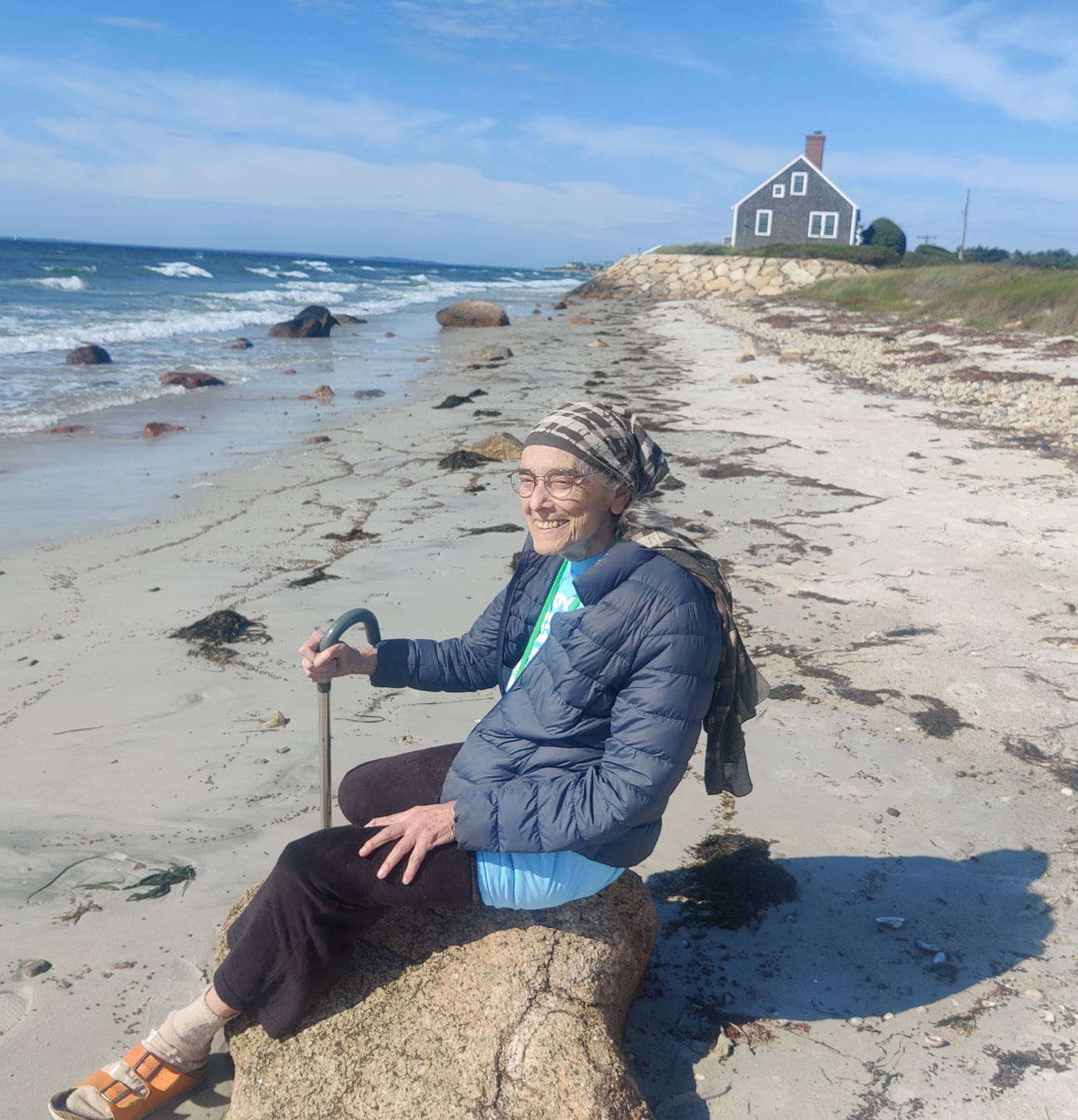
The history and philosophy of science community has lost one of its most innovative and controversial scholars. Evelyn Fox Keller was the third child of Albert and Rachel Fox. All three siblings were stars in their fields: microbiologist Maurice Fox, political theorist and activist Frances Fox Piven, and Evelyn herself, a pioneer in feminist history of science and indispensable theorist in feminist philosophy of science. Evelyn's 2023 memoir, Making Sense of My Life in Science, offers us an account of their early years as children of poor Russian immigrants in Queens, New York, ambivalent about their children's abilities and prospects. She chronicles the struggles and eventual triumphs of this astounding trio before continuing with her own no less extraordinary trajectory.
Picture 12: Evelyn Fox Keller at Black Beach, Falmouth, Massachusetts in 2021, courtesy of Diane Paul
Evelyn began her academic career first as a student of physics. Her 1977 essay, “The Anomaly of a Woman in Physics,” details the obstacles, amounting to severe harassment, she experienced as a graduate student in physics at Harvard. After completing her degree, she turned to mathematical biology, a field slightly less hostile. Working with Lee Segal, she used Alan Turing's diffusion equations to model the self-organization of slime mold organisms, thus challenging the then dominant idea of a genetically distinct pacemaker cell controlling the transition from a mass of undifferentiated individual cells to fruiting body. Her career as a rebel and innovator was launched by that paper, a career made even more arduous by her role as single mother of two children, Jeffrey and Sarah.
Evelyn continued to teach mathematics but turned her attention to history and philosophy of science. Her biography of the geneticist, Barbara McClintock, A Feeling for the Organism, published in 1983 emphasized McClintock's methodology as well as her accomplishments. McClintock, who introduced the idea of genetic transposition before the structure of DNA had been decoded, professed a kind of identification with the organisms she studied. Evelyn had found a kindred soul whose approach to the natural world more closely matched her own: the natural world was characterized by complex modes of self-ordering and self-organization, involving interactions within the organism and between the organism and its environment. Her next book, the 1986 Reflections on Gender and Science, elaborated that approach but was primarily known for its critique of the masculinist orientation infusing modern science. She urged adoption of a flexible interactionist relationship between investigator and investigated, rather than a relationship marked by the desire to control natural processes. In this book, she relied on ideas from the object-relations school of psychoanalysis. The book had something of a stealth introduction, circulating primarily among feminist scholars, but gradually expanded its readership. It went through multiple editions, was widely translated, and spawned many ancillary projects and volumes by those inspired by her ideas. It established Evelyn as a principal and distinctive voice in feminist science studies.
Evelyn continued to pursue feminist lines of inquiry, for example in her work on the developmental biologist Christiane Nüsslein-Vollhart. Her methodological framing, however, changed from psychoanalysis to language and metaphor. She was a fierce critic of single factor explanation in biology and an astute detector of the metaphors that led researchers down certain lines of inquiry and not others. Refiguring Life is an analysis of the role played by machine and information metaphors in biological research. The Century of the Gene is an analysis of the idea of “gene action” and its occlusion of the dependence of genetic processes on factors external to the DNA molecule: genes are activated, not active and genetic processes are complex interplays of diverse molecules and their environments.
Evelyn pursued the theme of complexity throughout the rest of her work, work that is itself complex, involving history, philosophy, and biological theory. Her 2003 Making Sense of Life combined historical research tracing the variety of 20th century mathematical approaches to organismic development with philosophical and epistemological reflection on the nature of knowledge, underlining its dependence on the questions asked, the conception of understanding assumed, and the dependence of that conception on the investigative tools available. In that work, she goes so far as to suggest that a complete understanding in human terms of embryological development might not even be possible. Anyone can say this; Evelyn demonstrated why this might be with a detailed analysis of the role of computational machines in both mimicking and explaining life processes, raising the question: in what sense and for whom is a computer model of biological synthesis that replicates that process an explanation of an organism's development.
In 2010, supported by her previous thinking about the complexity of organismic transformation, she addressed in The Mirage of a Space Between Nature and Nurture the so-called nature-nurture divide. And as the planetary climate crisis became salient among political concerns, she turned to that issue, teaching with Philip Kitcher and coauthoring with him the 2017 The Seasons Alter, intended to equip ordinary citizens to counter some of the most prevalent disinformation regarding global warming.
Evelyn was never content with any intellectual landing place. Ever restless and provocative, she continually challenged current ways of thinking. She did not see herself as advancing history of science or social studies of science or philosophy of science per se, but she inspired scholars, especially but not exclusively feminist scholars, in all these areas to break new ground in their disciplines. For her, history and philosophy were not fields to be pursued for their own sakes, but tools in service to the articulation of a philosophy of nature. While her work displays commitment to a vision of the natural world as complex, yet self-ordering, she nevertheless resisted settling on any language or formulation to express this. Her legacy will, similarly, exceed any attempt to define it.
Works of Evelyn Fox Keller mentioned in this text:
- 1977. The Anomaly of a Woman in Physics. In: Sara Ruddick and Pamela Daniels, Working It Out. Pantheon.
- 1983. A Feeling for the Organism. W.H. Freeman.
- 1986. Reflections on Gender and Science. Yale University Press.
- 1995. Refiguring Life. Columbia University Press.
- 2000. The Century of the Gene. Harvard University Press.
- 2003. Making Sense of Life. Harvard University Press.
- 2010. The Mirage of a Space Between Nature and Nurture. Dule University Press.
- 2017. The Seasons Alter. Liveright Books.
- 2023. Making Sense of My Life in Science. Modern Memoirs.
Helen Longino
Stanford University
In memoriam Everett Mendelsohn (1931–2023)
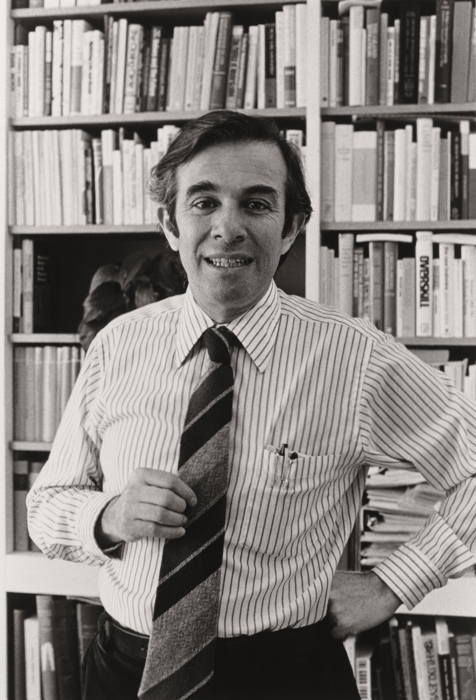
It would not be quite true to say that Everett Mendelsohn single-handedly created the field of the history of the life sciences, but he came close. His own scholarly research focused extensively on this area, beginning with his early work in 19th-century physiology on the puzzle of “animal heat” and extending into his later engagement with biological models and metaphors. Equally significantly, though, Everett was the founder and long-time editor of the Journal of the History of Biology, the earliest and one of the most important publications of its kind. In his editorial foreword to the first issue of the journal in March 1968, he talked about the fact that “the physical sciences have long served as the paradigm for work in the history of science,” but the field was changing and expanding, and it was time to provide a forum for a new generation of scholarship focused on the life sciences. In 1998, he published another editorial in the journal as he prepared to step down from a role that had been a focal point of his intellectual life for thirty-one years. In that editorial, he marveled at the “explosion of interest” in the history of the life sciences he had witnessed during that time. What he didn't say was that he was in no small part responsible for that, creating as he did a home over decades for the scholarship of countless young scholars. He also didn't say something that was also true: over the past thirty years, he had personally supervised more dissertations in the history of the life sciences than anyone else in the field.
In the classroom, Everett had a gift of gathering together the threads of a discussion, tidying up any incoherencies, and distilling the deeper insights. "Let me see if I can pull together what I am hearing here," he would say. Then he would show students an elevated and elegantly synthesized version of their contributions so that they would all find themselves amazed and impressed by their own collective thoughtfulness. He was no less famous for his belief that every graduate student, to earn a degree, should be made to go out to Harvard Square, find some ordinary people, and explain to them what their dissertation is all about. He expressed this view in part because, even as he had made a commitment to nurturing the development of historical studies of the life sciences, he had also been emerging as one of a new generation of social historians of science who insisted that it was not enough to pay attention to the internal intellectual story of science—scholars needed to also attend to how science was shaped by and also helped shape the conditions of the social world. This meant also that their scholarship needed to be accessible to and accountable to that same social world.
This takes me to the next critical thing we all need to remember about Everett: the fact that he was not just an academic, a mentor, and a teacher. He was also an activist and committed pacifist. With the support of the American Friends Service Committee, he spent decades, especially in the 1980s and 90s, working for a peaceful solution to the Israeli-Palestinian conflict. This work included hosting then-secret meetings for Israelis and Palestinians which contributed to the laying down of the groundwork for the Oslo Accords. He was equally active in nuclear disarmament and arms control efforts, serving (among other things) as president of the International Council for Science Policy Studies, as a founding member of the American Association for the Advancement of Science's Committee on Science, Arms Control, and National Security, and as a founder and first president of the Cambridge-based Institute for Peace and International Security. At a recent memorial in Everett's honor, numerous people testified to the courage he showed in this part of his life, his willingness to speak uncomfortable truths when needed, and the resilience of his commitment to moral action, even in the face of setbacks. One participant at the memorial, trying to capture the collective sense we all felt of the man, turned to Shakespeare, to The Merchant of Venice. Like a candle in the dark, he suggested, Everett had been “a good deed in a weary world.”
I will say, in closing, that he was a good deed in part because of the way that he lifted others up to find their own place and path in that world. In the 1980s, during the fall of my senior year at Harvard, I had reached out to Everett because I was struggling to figure out if it would be selfish to go to graduate school and become an academic, given the many profound problems facing the world. I knew Everett had managed to pursue a life in academia while also remaining committed to various social causes, and I wanted to know how he had done it. I was a shy kid, and it took a lot for me to do this. I will always remember what happened next. He stopped, looked at me, and said, “This question is too important to just answer here. Let me take you out to lunch.” And so we went out for a hamburger, and by the end of our long conversation, I had come to believe it would in fact be possible to pursue an academic path without betraying my other values and commitments. At Everett's memorial, numerous people stood up, one after another, and told stories similar to my own. We were all amazed to learn of them from one another. It is perhaps no wonder that Harvard now annually offers a prestigious award named in his honor, The Everett Mendelsohn Excellence in Mentoring Award. He will be deeply missed.
Anne Harrington
Harvard University
Credits
This newsletter was edited by David Suárez Pascal employing GNU Emacs and Scribus (both open source and freely available). I thank Rachel Ankeny for proofreading it, and all the ISH members who kindly contributed to this issue with their texts.
Submissions for the newsletter should be addressed to:
